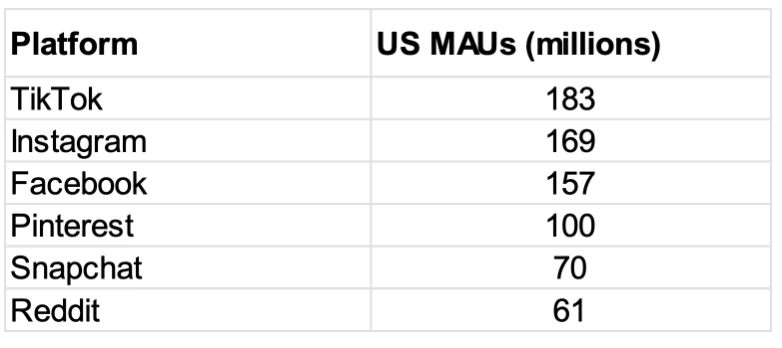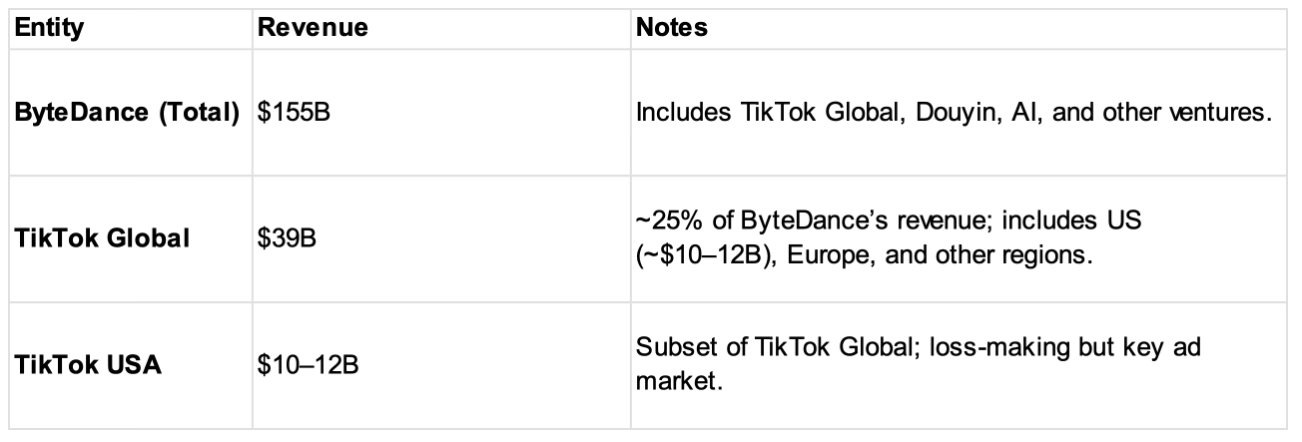TikTok US Deal: Business before Politics
Key Points
- TikTok is allegedly the social media app with the highest amount of monthly users in the US and the fact that it is not US owned makes the American political elite concerned about the user data and the algorithm, forcing this divestiture
- TikTok US represents less than 10% of ByteDance revenue, currently making losses due to the complex regulatory environment
- A US-led consortium (Oracle, Silver Lake, Andreessen Horotwitz) will most likely own 80% of the US entity, with Oracle managing both the data and the algorithm.
- The deal could benefit ByteDance by shedding a loss-making asset and funding AI investments. Oracle’s stock may face unpriced risks from integration costs and algorithm challenges.
An App that Defined 2020’s as a Decade
TradingKey - Just like how Facebook took over the world by storm in the late 2000s, TikTok took over the world in the early 2020s. The catalyst for TikTok’s rise was the COVID-19 pandemic, which kept people at home with little to do, forcing them to engage in non-stop doom-scrolling through short videos with viral melodies. To demonstrate the scale of the app, we can simply look at the monthly active users (MAUs): In January 2020, TikTok US MAUs were just around 37 million, but by mid-2020, it hit 100 million. As of the most recent data of 2025, TikTok has 183 million monthly users within the country (more than half of the population), and that’s slightly more than both Facebook and Instagram. However, unlike Facebook or Instagram, TikTok is not owned by a US entity but by the Beijing-headquartered ByteDance, and that’s the main controversy.

Source: Company reports
The reason why the US political elite is so uncomfortable with TikTok not being owned by US investors is twofold. Firstly, we have a massive amount of US user data that can be exposed to a foreign entity/government. We are talking about 180 million users, their interests, preferences, etc.. The second aspect is the algorithm. If the algorithm is controlled by a foreign entity, it can easily recommend content to the public that can bend and shape the public perception towards certain topics. This can be specifically sensitive during periods of elections.
From the legal side, the signed Protecting Americans from Foreign Adversary Controlled Applications Act (PAFACA) already classifies TikTok as a "foreign adversary controlled application" due to ByteDance's ownership and requires divestiture to a non-Chinese entity (e.g., US or allied buyers) by a deadline, or face a nationwide ban. Without divestiture, app stores like Apple and Google would be prohibited from distributing or updating TikTok, leading to its gradual shutdown.
The ban has been in effect since January this year, but President Trump has issued multiple extensions (the latest on September 16, pushing the deadline to December 16) to allow ongoing negotiations for a sale. This makes the whole deal not just sensitive to execute but also quite urgent in terms of timeline.
We should also have in mind that the operations of TikTok in the rest of the world would continue to be under ByteDance control.
So, what are the financial aspects of the TikTok deal

Source: Bloomberg
If we move away from the political rhetoric, we can see the deal from a different perspective.
ByteDance, the parent company of TikTok, owns two entities - Douyin and TikTok Global. ByteDance revenue segmentation as of 2024 is the following:
- Douyin (Chinese app): $106bn; Douyin represents the large majority of ByteDance’s business, with nearly 68% percent of the revenue.
- TikTok (Global app): $39bn revenue, or approximately 25% of the total revenue, is what we know as TikTok.
- Other business ventures: $10bn or 7% of the total revenue
Within the $39B revenue from global operations, the TikTok US is just $10-12bn, which means that TikTok US represents less than 10% of ByteDance revenue - not a significant portion as many would believe.
Not only is the revenue impressive, but ByteDance is well into profitability with $33bn net profit (or 22% net profit margin). However, the most surprising part is that TikTok US is still loss-making (-$500mln) mostly due to all the regulatory and compliance costs.
As the TikTok US valuation is not yet fixed but expected to be in a range of $50-$60bn, ByteDance would most definitely receive a large portion of it in cash. The current cash position of the parent company stands at around 50 billion, and the new proceeds ($40-$48bn) will almost double the balance.
Overall, the benefits of the deal are evident for ByteDance, attributed to the following:
- ByteDance can get rid of an asset that is unprofitable and hard to manage due to regulations
- ByteDance can focus on the global operations, which is a significantly bigger market
- The proceeds from the divestment (a number not fixed but expected to be between $30-50B can be used for capex investments, enhancing the company’s AI capabilities
- Finally, even after the divestment, ByteDance will retain 20% ownership, still having a certain exposure to the US market
Is the suggested price of 40-50b a reasonable one? Probably not. This deal assumes a P/S ratio of 4-5x, which is higher than the P/S ratio of Snapchat (3.4x) but significantly lower than those of Meta (9x), Reddit (22x) and Pinterest (6x). Also, TikTok US revenue is expected to grow at around 20% with the potential to see profitability break even.
Ownership and Board Structure
The ownership of TikTok US after the deal will most likely be:
- 80% owned by a US-led consortium. The certain participants are Oracle, Silver Lake (private equity), Andreessen Horowitz (a16z), as well as other US investors yet to be disclosed.
- 20% remaining ownership for ByteDance, which is mostly passive, with just financial exposure but no operational control
The 7-seat board will also be dominated by US investors, holding six seats, while ByteDance will hold only one.
On both the ownership and board levels, the US government will not have any representatives.
Oracle being the main character in the drama
Oracle will be the main player here, being responsible for handling the user data and the algorithm. Thus, they will probably get the most significant stake of around 20-40% of the total US entity.
TikTok US cannot use the existing ByteDance-controlled algorithm due to national security and legal requirements. Instead, Oracle will create and manage a US-specific version of the algorithm and host it on its cloud to ensure independence from ByteDance.
With the deal, Oracle will enter an entirely new for them market - the fast-growing and dynamic advertising and e-commerce businesses. This will put the company on an equal footing with Meta, Google and Amazon. The deal will also solidify their cloud segment as one of the leading ones. Oracle already handles the US data of TikTok, which brings a certain advantage of them to come up with a robust algorithm.
However, there are also certain risks for Oracle, as eventually TikTok might be a too big of a bite for Oracle’s mouth:
Oracle may not be able to effectively replicate the ByteDance algorithm (one of the most complex in the world), which can lead to a drop in user engagement, something that formidable competitors like Meta and Alphabet would be happy to capitalize on and take market share in the users’ attention.
In fact, handling the day-to-day operations of a social media platform is not something Oracle is an expert in. Oracle’s AI expertise is enterprise-focused, not consumer-social-media-specific. TikTok’s real-time personalization requires specialized knowledge that exceeds Oracle’s in-house social media experience, and they have to compete with Google and Meta, who have decades of experience and know-how.
The financial upside for Oracle may not be so significant either. Perhaps, Oracle will not record TikTok business as a revenue segment because they don’t own 50% of the entity, but the profit will be recorded at the bottom line. Due to TikTok US being loss-making, we will more likely see the loss being recorded in Oracle’s profit line, and it will probably take a while to see the entity, reaching break even. With this, we may also see an increase in operating expenses from the business integration process. Not to mention that TikTok may need to go on a hiring spree, looking for AI talent - a mission that can be both hard and pricey due to competition from Meta, Google and Amazon and the recent visa restrictions.
Also, if the assumptions of 40% ownership by Oracle at a valuation of $40-$50bn are correct, the company may have to pay $16-$19bn for TikTok US. The current cash position of Oracle is $11bn, which most probably means they must borrow money to finance the deal. In the last fiscal year, the company’s free cash flow was negative simply because all the operating cash flows go for capital expenditures. Further to this, the deal with OpenAI may further strain the financials of Oracle, making the TikTok acquisition more complex in nature.
Investment Implications
As ByteDance itself is not a listed company, some people may find it hard to draw any actionable investment conclusions. However, there are several long-term effects on certain stocks:
Chinese tech stocks: Despite the US Government framing the deal as a win against China tech, this actually sets a good example of how Chinese tech firms can enter the US market in the future - with cooperation (co-investment, joint ventures) with large US tech peers. In such a way, we can see an aligned interest between Chinese and American tech firms, while the political risks can be minimized and Chinese tech can still get exposure to the lucrative American market.
Oracle (ORCL): Oracle has been having a great year so far, and being the central player in the TikTok US future further contributes to the bullish sentiment of the stock. However, the market seems not to have priced the 1) risks associated with the complexity of recreating the complex algorithm and the venturing into a social media business; 2) the future large investments in terms of opex and capex that can strain the margins and the balance sheet of the firm.
Meta (META) and Alphabet (GOOGL): Now that we know there will not be a ban of TikTok in the US, the incumbent social media players, Meta (Facebook and Instagram) and Alphabet (YouTube), will have to face the long-term competition from TikTok. As incumbents in this area, they do have an advantage, but if Oracle does a great job in building an algorithm, this can steal user attention from them and hence ad revenue.
ByteDance (not listed): With this legal obstacle behind them and with potentially 30-40 billion more cash, ByteDance can focus on its operations in both China and the world, invest further in its capabilities and maybe work towards going public, which will surely be a blockbuster IPO.
-f6c6cdd53c2347029222173888f5edc1.jpg)
Get Started



